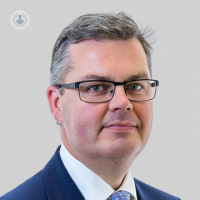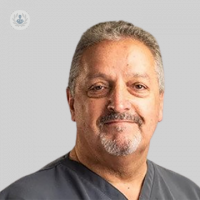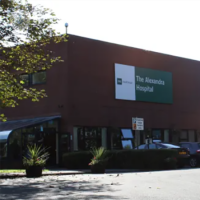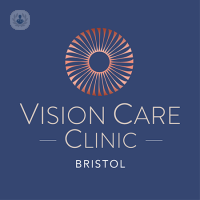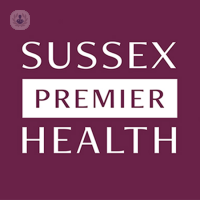What are cataracts?
Cataracts occur when the lens in the eyes become cloudy, either completely or partially. Cataracts occur most commonly due to age, inflammation, or steroid use.
What main symptoms can the appearance of cataracts cause?
When the lens becomes cloudy, you may notice your vision is more hazy and that you notice glare from bright lights. You may also notice your optometrist tells you your glasses prescription may change more than usual.
How are cataracts treated?
Treatment for cataracts is usually a simple cataract surgery, which is often performed as a day-case procedure with a local anaesthetic.
What does cataract surgery entail?
During cataract surgery, the surgeon will remove the natural lens inside the eye and replace it with an artificial lens that is calculated specifically for your eye.
Cataract surgery is a routine, straightforward surgical procedure that typically lasts between 30 to 45 minutes. Patients who undergo cataract surgery can go home on the same day of the surgery.
A six to 12 weeks gap is usually left between the two eyes being operated on, when this is necessary.
What happens before cataract surgery?
Prior to undergoing cataract surgery, the patient will need to be referred to a specialist eye surgeon (ophthalmologist) to undergo an eye assessment to determine the measurements of the eyes (biometry). Patients may require ultrasound scans to confirm specific dimensions of the eye and it is very common to obtain an OCT (Optical Coherence Tomography) scan to make sure the retina is healthy prior to surgery.
What are the benefits of cataract surgery?
There are many benefits of undergoing cataract surgery, with the main ones including:
- improving vision
- reducing glare
- improved colour saturation
- reduced dependence on glassses
What are the risks of cataract surgery?
The main risks of cataract surgery are as follows:
- 1 in 1000 risk of permanent visual loss as a result of infection or retinal detachment.
- 1 in 100 risk of requiring more than one procedure, but ultimately having a good visual outcome.
- 1 in 10 risk of requiring a quick and easy procedure called a YAG capsulotomy to 'polish' the lens 6-12 months after the surgery.
What types of lenses are implanted?
Most lenses are monofocal. This means that patients are left with good vision at a specific distance. Usually patients request to have distance vision either with no glasses, or just a weak prescription. They will require reading glasses in order to read a book or see their phones.
Occasionally, patients who are short sighted (myopic), request to be left short sighted. This means that they will be able to read without glasses after surgery, but will need glasses to see in the distance.
Patients who have significant astigmatism may benefit from a toric lens, which reduces astigmatism and makes glasses prescriptions more simple. This can be discussed during your consultation.
What specialist performs cataract surgery?
Ophthalmologists are responsible for performing cataract surgery.
12-04-2020 04-20-2023Cataract surgery
What are cataracts?
Cataracts occur when the lens in the eyes become cloudy, either completely or partially. Cataracts occur most commonly due to age, inflammation, or steroid use.
What main symptoms can the appearance of cataracts cause?
When the lens becomes cloudy, you may notice your vision is more hazy and that you notice glare from bright lights. You may also notice your optometrist tells you your glasses prescription may change more than usual.
How are cataracts treated?
Treatment for cataracts is usually a simple cataract surgery, which is often performed as a day-case procedure with a local anaesthetic.
What does cataract surgery entail?
During cataract surgery, the surgeon will remove the natural lens inside the eye and replace it with an artificial lens that is calculated specifically for your eye.
Cataract surgery is a routine, straightforward surgical procedure that typically lasts between 30 to 45 minutes. Patients who undergo cataract surgery can go home on the same day of the surgery.
A six to 12 weeks gap is usually left between the two eyes being operated on, when this is necessary.
What happens before cataract surgery?
Prior to undergoing cataract surgery, the patient will need to be referred to a specialist eye surgeon (ophthalmologist) to undergo an eye assessment to determine the measurements of the eyes (biometry). Patients may require ultrasound scans to confirm specific dimensions of the eye and it is very common to obtain an OCT (Optical Coherence Tomography) scan to make sure the retina is healthy prior to surgery.
What are the benefits of cataract surgery?
There are many benefits of undergoing cataract surgery, with the main ones including:
- improving vision
- reducing glare
- improved colour saturation
- reduced dependence on glassses
What are the risks of cataract surgery?
The main risks of cataract surgery are as follows:
- 1 in 1000 risk of permanent visual loss as a result of infection or retinal detachment.
- 1 in 100 risk of requiring more than one procedure, but ultimately having a good visual outcome.
- 1 in 10 risk of requiring a quick and easy procedure called a YAG capsulotomy to 'polish' the lens 6-12 months after the surgery.
What types of lenses are implanted?
Most lenses are monofocal. This means that patients are left with good vision at a specific distance. Usually patients request to have distance vision either with no glasses, or just a weak prescription. They will require reading glasses in order to read a book or see their phones.
Occasionally, patients who are short sighted (myopic), request to be left short sighted. This means that they will be able to read without glasses after surgery, but will need glasses to see in the distance.
Patients who have significant astigmatism may benefit from a toric lens, which reduces astigmatism and makes glasses prescriptions more simple. This can be discussed during your consultation.
What specialist performs cataract surgery?
Ophthalmologists are responsible for performing cataract surgery.
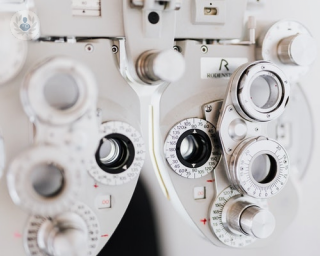

Dry eye syndrome after cataract surgery
By Mr Bal Manoj
2024-10-31
Cataract surgery can result in dry eye syndrome and in this condition, the surface of the eye becomes dry due to not producing enough tears. While it’s not a danger to your health, it can be irritating and bothersome. Mr Bal Manoj, a leading cataract surgeon who has performed countless cataract surgeries, explains why dry eye syndrome happens after surgery and how it’s treated. He also offers his professional advice for avoiding dry eye. See more
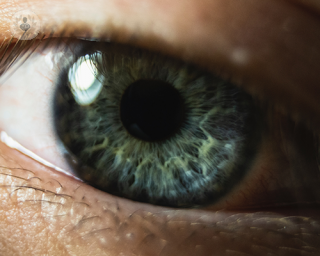

Is a multifocal lens implant the right lens for you?
By Mr Alexander Ionides
2024-10-31
Choosing the right lens implant for cataract surgery requires specialist guidance. Mr Alexander Ionides shares his expertise on multifocal lenses to help you decide. See more
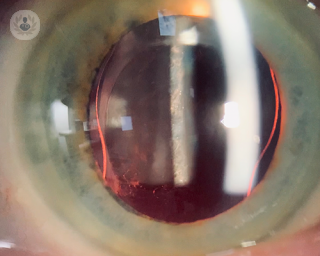

Is YAG laser capsulotomy as safe and simple as they say?
By Mr Colin Vize
2024-10-31
If your vision is getting blurry after having undergone cataract surgery, you might have Posterior Capsule Opacification (PCO) and need further treatment. Mr Colin Vize answers several key questions that patients have along their treatment journey. See more


Choosing the right intraocular lens for cataract surgery
By Mr Thomas Kersey
2024-10-31
Cataracts, characterised by the clouding of the eye's natural lens, are a common condition, particularly among older adults. Cataract surgery, which involves replacing the clouded lens with an artificial one, is a highly effective treatment. The success of this procedure is greatly influenced by the choice of intraocular lens (IOL). In his latest online article, Mr Thomas Kersey explores the various IOL options available, helping patients make informed decisions in collaboration with their ophthalmologists. See more
Experts in Cataract surgery
-
Professor Chris Hammond
OphthalmologyExpert in:
- Strabismus (squint)
- Paediatric ophthalmology
- Cataract surgery
- Glaucoma
- Dry eye
-
Mr John Brookes
OphthalmologyExpert in:
- Glaucoma surgery
- Cataract surgery
- Paediatric ophthalmology
- Congenital glaucoma
- Cataracts
- Glaucoma
-
Professor Philip Bloom
OphthalmologyExpert in:
- Cataracts
- Cataract surgery
- Glaucoma
- Glaucoma surgery
- Minimally invasive glaucoma surgery (MIGS)
- Selective laser trabeculoplasty (SLT)
-
Mr Alexander Ionides
OphthalmologyExpert in:
- Cataract surgery
- Cataracts
- Laser eye surgery
- LASIK
- Lens replacement (intraocular lenses)
- Multifocal contact lenses
-
Mr Vaughan Tanner
OphthalmologyExpert in:
- Cataract surgery
- Epiretinal membrane
- Macular hole
- Macular degeneration (AMD)
- Eye floaters
- YAG laser capsulotomy
- See all

The Alexandra Hospital - part of Circle Health Group
The Alexandra Hospital - part of Circle Health Group
Mill Ln, Cheadle
No existe teléfono en el centro.
By using the telephone number provided by TOP DOCTORS, you automatically agree to let us use your phone number for statistical and commercial purposes. For further information, read our Privacy Policy
Top Doctors

Vision Care Clinic
Vision Care Clinic
The Chesterfield Nuffield Health Bristol Hospital, 3 Clifton Hill, Bristol, BS8 1BN
No existe teléfono en el centro.
By using the telephone number provided by TOP DOCTORS, you automatically agree to let us use your phone number for statistical and commercial purposes. For further information, read our Privacy Policy
Top Doctors

Sussex Premier Health Eastbourne
Sussex Premier Health Eastbourne
Eastbourne District General Hospital, Kings Drive, Eastbourne, East Sussex
No existe teléfono en el centro.
By using the telephone number provided by TOP DOCTORS, you automatically agree to let us use your phone number for statistical and commercial purposes. For further information, read our Privacy Policy
Top Doctors
-
The Alexandra Hospital - part of Circle Health Group
Mill Ln, Cheadle, CheadleExpert in:
- Hip
- Cardiology
- Shoulder and elbow
- Paediatrics
- Foot and ankle
- Knee
-
Vision Care Clinic
The Chesterfield Nuffield Health Bristol Hospital, 3 Clifton Hill, Bristol, BS8 1BN, BristolExpert in:
- Cataracts
- Laser eye surgery
- Refractive surgery
- ICL lens implants
- Lens replacement
- Corneal transplant
-
Sussex Premier Health Eastbourne
Eastbourne District General Hospital, Kings Drive, Eastbourne, East Sussex, EastbourneExpert in:
- Cataracts
- Eyelid surgery
- Joint preservation surgery
- Women’s health
- Urology
- See all
- Most viewed diseases, medical tests, and treatments
- Minimal access surgery (keyhole surgery)
- Botulinum toxin (Botox™)
- Medicolegal
- Dermal fillers
- Headache
- Strabismus (squint)
- Glaucoma
- Diplopia (double vision)
- Amblyopia
- Vision therapy



